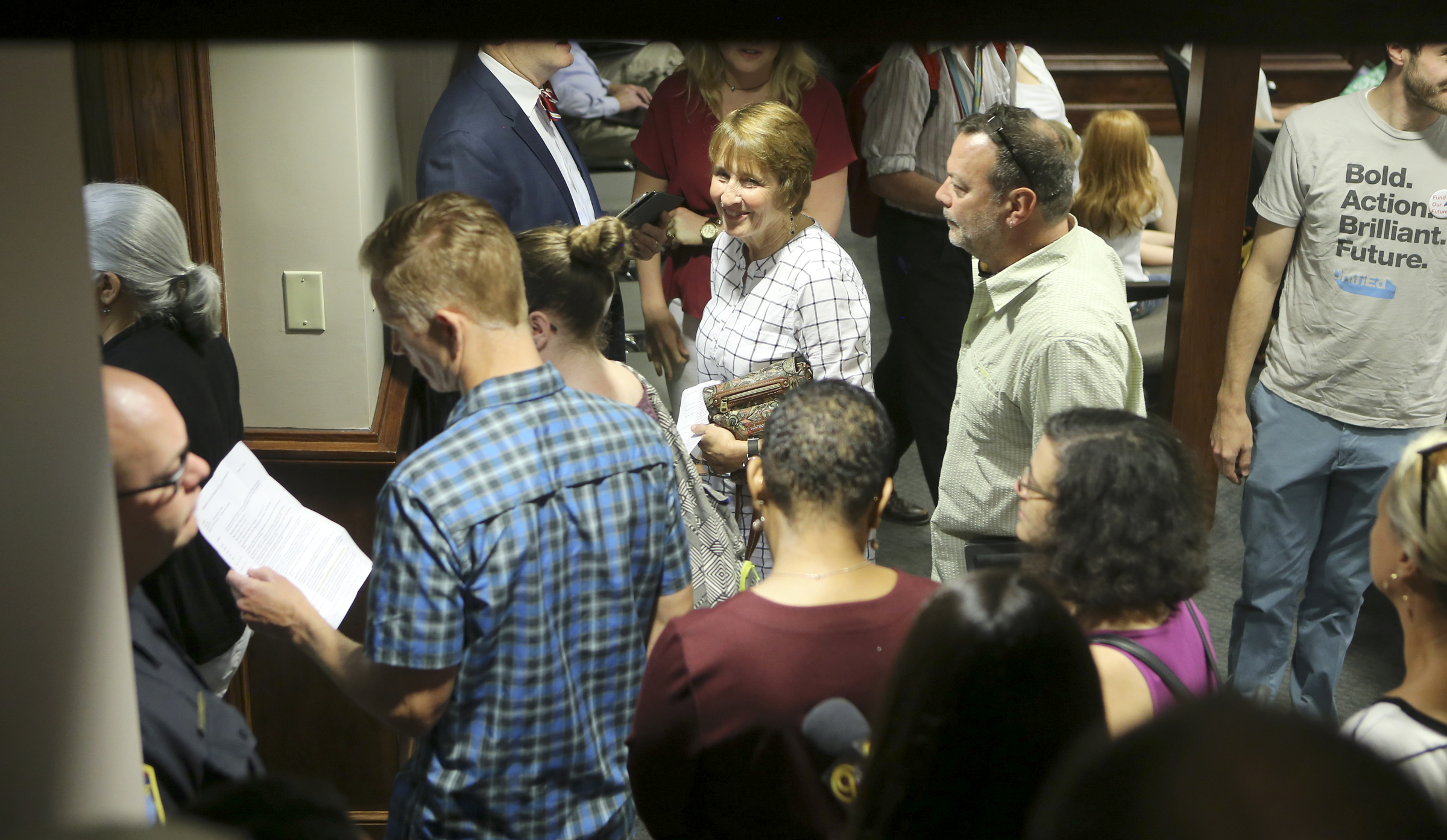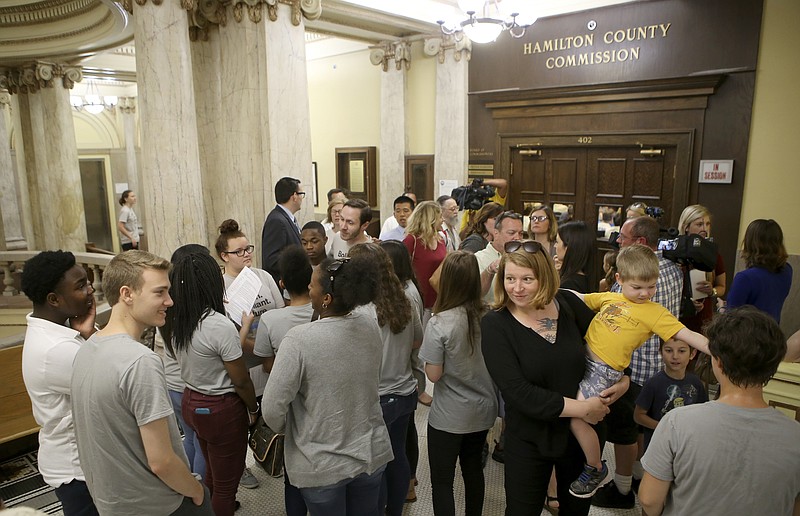 Supports with UnifiEd, an education advocacy nonprofit, leave the County Commission assembly room after the Commission voted on the budget for the 2018 fiscal year at the Hamilton County Courthouse on Wednesday, June 21, in Chattanooga, Tenn. The budget was passed without a tax increase for public schools. UnifiEd supported the tax increase.
Supports with UnifiEd, an education advocacy nonprofit, leave the County Commission assembly room after the Commission voted on the budget for the 2018 fiscal year at the Hamilton County Courthouse on Wednesday, June 21, in Chattanooga, Tenn. The budget was passed without a tax increase for public schools. UnifiEd supported the tax increase.More than 150 people packed the Hamilton County Commission meeting Wednesday morning in a last-ditch effort to increase funding for the county's public schools.
Despite the showing, the commission quickly voted 8-1 to approve Hamilton County Mayor Jim Coppinger's $691.5 million budget, which does not include a tax increase to fund $24 million in additional needs identified by the Hamilton County Board of Education.
Commissioner Tim Boyd cast the dissenting vote, requesting the commission wait 30 days before approving the budget for this upcoming fiscal year. His motion failed for lack of a second.
The budget the commission approved allocates $425.7 million to the district's budget, an increase of about $8 million from last year thanks to dedicated growth money from increased tax revenues and state funding. Local revenues account for $5.7 million of the total.
The general fund budget - $222.7 million - is a $4 million increase over last year. It provides a 1.5 percent salary bump for county employees and funds 16 more jailers and six student resource officers for the Hamilton County Sheriff's Office.
At the end of Wednesday's meeting, several commissioners thanked everyone for attending and many welcomed the district's newly chosen superintendent, Bryan Johnson, who was seated in the front row.
Commissioner Sabrena Smedley told Johnson she's excited to work together and hopes the commission and school board will have a joint meeting soon.
"I look very forward to hearing your wisdom and insight on funding and how to address some of our challenges," Smedley said.
Commissioner Randy Fairbanks echoed support for Johnson and said the commission wants to support the school district.
"We look forward to doing anything we can to help you," he said.
But at the end of the meeting, when the public is allowed to comment, three people voiced frustration with the commission's decision not to increase school funding for the 12th consecutive year.
Franklin McCallie, a retired educator, said the commission needs to invest more revenue in public education to make the system great.
"Let's not just say to our new superintendent and school board, 'We're going to support you with anything you need,' unless we mean it," McCallie said.
Some kids in Hamilton County are not receiving the education they deserve, McCallie added. He urged the county to address the inequities that exist and start providing every student with the opportunity to be successful.
Greg Beck, vice chairman of the commission, commended McCallie and said the commissioners need courage.
"If you can find a bucket full of it out there to pour on us you'd do well," Beck said.
McCallie said the problem isn't a lack of courage, but that the commission doesn't understand or think additional resources will make a difference in education. He said until the county believes every student is important, it will not adequately fund every school.
Beck said that's an indictment of commissioners if true, and the reason the commission hasn't increased taxes for schools is likely political. He noted his willingness to raise taxes for schools.
"We are ready," he said. "District 5 is willing."
McCallie responded: "I hope every district is, sir."
Rosabelle Gorman, a community member, also addressed commissioners about the budget, noting that it's the last one they'll approve before launching their 2018 re-election campaigns.
"Do you expect the community to believe that if you won't raise taxes to fund education this year, that it will happen next year - two months before the election?" she asked. "And if not next year, which year?"
Hamilton County Schools plans to use the additional $8 million it will receive in growth money to provide educators with a 3 percent raise, and to cover the increasing cost of transportation and custodial services.
It would have taken a 26.7-cent property tax hike to pay for the additional $24 million in school needs requested by the school board. That would mean $106 more in annual property taxes for a $158,000 home, the median value of owner-occupied housing in Hamilton County.
A group of prominent business leaders compiled a report, released last month, detailing strategies the county and school district should implement to bring long-term savings and boost student outcomes. One of the recommendations was that the county establish a new tax dedicated to schools infrastructure, tech and innovation.
The commission has not publicly considered that option during months of budget discussions.
Coppinger thanked the eight commissioners who voted Wednesday to approve the budget, and applauded all nine of them for being heavily invested in the budget process.
Earlier this month, Coppinger sent a letter to school board chairman Steve Highlander, asking that the county and school board continue discussions about the district's budget.
Coppinger said he doesn't want to wait until next spring to reignite conversations around the need for more revenue, adding that he hopes both groups can work together to develop specific goals for the district and prove to the public that more money invested in public education will improve outcomes.
UnifiEd, a local education advocacy nonprofit organization, rallied much of the crowd that attended the meeting Wednesday. The group has been calling on the county to prioritize public school funding for months, and had more than 2,100 Hamilton County residents write letters to the commission voicing support for increased school revenue.
After the vote, Demetrius Williams, a junior at Tyner Academy, said he's disappointed with the commission's decision.
Williams has been working with UnifiEd to make calls and collect the letters of support, and said he was hoping for a different outcome.
"There is a lot of stuff [in our schools] that needs to be fixed," he said. "We could really use more funding."
Contact staff writer Kendi A. Rainwater at krainwater@timesfreepress.com or 423-757-6592. Follow on Twitter @kendi_and.
